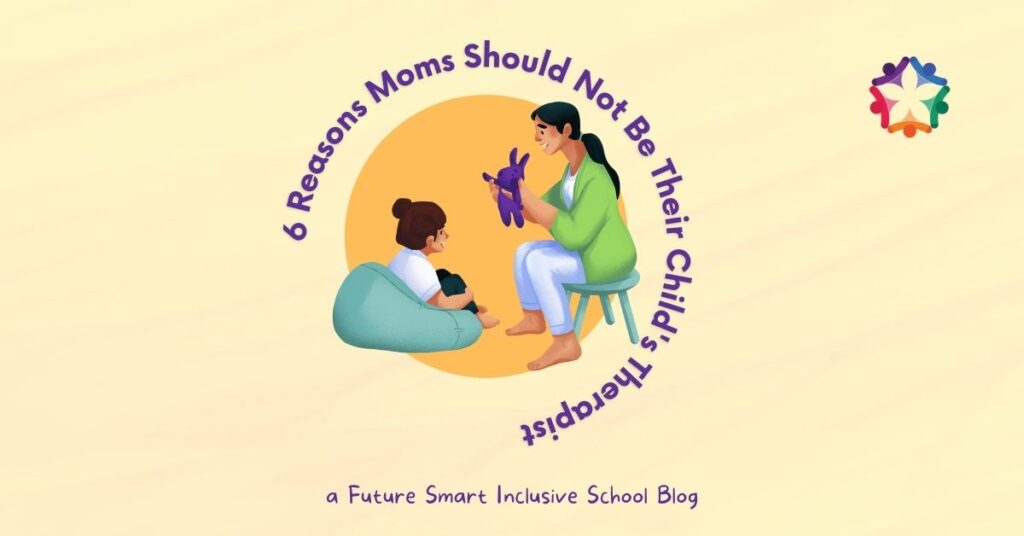6 Reasons Moms Should Not Be Their Child’s Therapist

There are good reasons why we think moms should not be their child’s therapist! We are sure we will receive flak for this hot take. But truth must prevail.
Autism, ADHD and other disorders are complex. To manage them effectively, children need someone with specialized knowledge and training. Parents, specifically mothers, play an important role in supporting their children, but they are ill-equipped to provide the same level of interventions that trained professionals can. Here, we discuss a few reasons why moms should provide full support to their child, while the therapists handle the rest.
1. Lack of Professional Training
Professional therapists receive extensive training and education to develop the skills and techniques needed to help children with special needs reach their full potential. These therapists have a deep understanding of behavioural sciences and they use research backed practices to customize therapy to the needs of each child.
On the other hand, moms of autistic children have no professional training. True, they know their child, but this knowledge cannot substitute professional training. Wearing the therapist’s shoes requires specialized skills and knowledge that can only be attained through formal training in the field.
2. Emotional Attachment
Moms have a strong emotional attachment to their child. This makes it challenging for them to play the role of a therapist, which requires them to be neutral and objective during therapy. No matter how good of a therapist she is, but when it comes to her own child, she will always be “Amma” first and therapist second. The emotional attachment can lead to biased decision-making that may become an obstacle for the child’s progress in therapy.
The point can be explained with an example: as a mother, she may feel responsible for the child’s condition. To overcome this, she may have unrealistic expectations for their child’s progress. A professional therapist, on the other hand, will maintain a neutral and objective perspective during therapy and will use evidence-based practices for making decisions.
3. Potential for Burnout
This is a very important reason moms should not be their child’s therapist. Conducting therapy for a child with autism is a demanding task. It drains one emotionally and physically. Moms already have their tasks cut out for them, from being a home-maker to the primary caregiver. Each and every day, mothers shoulder huge responsibilities. Research also shoes that parents of children with autism experience psychological and emotional burden more than other parents. If mothers choose to take on the role of their autistic child’s therapist, they are at high risk of burnout. The demanding job of providing therapy can also interfere with the mother-child bond. It may also cause stress and strain the family ties.
4. Professional Therapists Have the 360 degree Approach
Professional therapists can provide holistic and comprehensive care for the child. Parents, or mothers may only focus on one angle during therapy, but professionals will address the various needs of the child, such as behaviour management, speech therapy and occupational therapy. Usually, the therapists work together to create a personalized plan that meets the child’s unique needs.
5. Limited Resources
Moms may have the fighting spirit for their child, but they will not have the access to resources or the expertise their child may need for effective therapy. The level of care required by the child may not be met by the rudimentary techniques used by mothers. This may include latest tools and techniques as well as specialized equipment required for therapy. Professional therapists, on the other hand, have access to the latest research, specialized tools and equipment.
6. Little or No Access to Evidence-Based Practice
Professional therapists use evidence-based practices enriched by scientific research. These practices have proved to be effective in improving outcomes for children on the spectrum. Professional therapists continuously remain updated in their fields to ensure that the therapy they provide is most effective. In contrast, moms of autistic children may not be up to date about the latest research in the field or evidence-based practices. Because of limited resources (see above), they may rely on outdated therapies that are ineffective and do not provide the best outcomes for their child.
The Parent-Child Connection
While at Future Smart Inclusive School, we never encourage the practice of moms being their child’s therapist, we fully understand and support the parent’s role in therapy, which is why we say that we adopt the whole family and not just the child! Our stance on the topic of moms not being their child’s primary or sole therapist stands but we also know that they still play a critical role in their child’s therapy. Parents are an essential part of the process. By working with a professional therapist, they provide emotional support and reinforcement for their child’s progress. Mothers can learn strategies to support their child’s therapy. They can also nurture a strong relationship with their child, just not as their therapist.
Looking for More?
You can read our other blogs here for more stories and information!




Leave a Reply